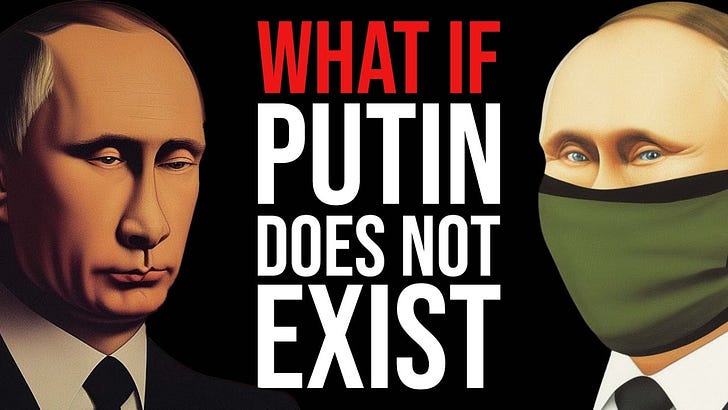These Monday posts, in which I’m sharing unfinished ideas, are going to soon become exclusive to paying subscribers and those who have contributed to Psychopolitica in the past.
I invite you to consider doing either (or both) by clicking the Subscribe button below and by sending me your art, thoughts, or ideas to nikita.s.petrov@gmail.com.
Below you will find a conversation I had about a month ago with Psychopolitica’s cover artist Giorgos Terzakis, when we were working on Fear and Power in the Russian Dreamscape.
It was intended as a private chat—Giorgos wanted to hear my thoughts on the war in Ukraine—but we decided to tape it in case we veer off into some unexpected territory and end up saying something we’d want to go back to.
That’s exactly what happened.
A new subscriber, an 85 year-old MD and professor of ophthalmology named Frank, recently asked me in an email about “my mission.” I said I am yet to formulate it clearly.
Listening now to this conversation I had with Giorgos, I’m realizing that this was a central theme: what are we trying to do with Psychopolitica? What is it for? And how is it supposed to accomplish it?
I’m planning to listen to the full thing tomorrow and reflect on it further. I will be grateful if you share your reflections as well.
Here is the video and an (edited) transcript of a segment I picked more or less at random.
NIKITA: …so, yeah, I haven't figured out yet what the origin point of the reality that I'm going to be constructing day after day is going to be. Like, where do I stand safely? Everything is in flux. But I think it is a challenge that needs to be taken up.
With all of these narratives being forced on me by journalists or politicians, who are actively trying to shape the way we see the world, and even by my own emotional composition… Like, the shame that I feel about things happening in Russia—that's not because some journalist put that on me. It's a normal human reaction, to feel ashamed for all of this.
But I don't think succumbing to that is the way forward. You need to find some place to stand on, and figure out a way to continue shaping your own reality in a way that's productive, in a way that's not going to just keep you thinking "the world is horrible" or "I'm a part of a horrible situation."
The way you create your reality needs to lead to your actions being helpful as opposed to damaging or stifling.
GIORGOS: I totally get your sentiment, and of course that's part of my understanding of the world and of reality too, but most of the time, I get this feeling of hopelessness. I have this feeling that there's nothing I can do that's enough. There are systems in place that have been set decades ago that cannot include me.
Let's say I'm not aligned with my country's policies. Maybe my country starts a war and I'm ashamed about it. I get this feeling that there's nothing I can do. There's nothing I can do that matters, that would create a separate reality from that.
Yeah, I understand what you mean. I have the same, or at least similar, feelings too. And I guess I've always had them, except that they've become harder to ignore since the beginning of the war.
The general feeling I've always had about the human civilization is... Well, it's fucked up. The systems of power that we have are—you know, I'm not impressed. I see shades of unfreedom.
I'm rarely inspired by a system of governance. I mean, maybe if I’m watching a really good American movie, and Edward Norton is making a speech about the First Amendment in the Supreme Court... But generally, it's shades of frustration.
I'm thinking back to my childhood. I'm six or seven, and I'm overhearing a conversation between my parents—if I'm six, that means it's 1994, so that's a year after the President’s tanks shot at the building of the parliament, so we had a lot of political talks at home...
Even then, and ever since then, I’ve always had this feeling that I don't want to give up on this reality and just say “It's all fucked up, politics is dirty business, so just don't engage.” I never liked that. I always wanted to be a part of some kind of a productive force that actually can accomplish big things. At the same time, I've always felt, with an oscillating degree of conviction, that feeling of hopelessness that you're describing.
One strain of thought that has been helpful to me is when I think about people in history—like, kinds of people in history—that I could feel a certain belonging to, a connection with, a sense that we're in a similar position.
In pre-Enlightenment times, there is an Alchemist who's sitting at home, trying to figure something out by mixing things in his little laboratory, and he has some kind of a mythopoetic view of the world, and he's looking at what mercury is doing in his retort, and he's keeping in mind that mercury is a representation of the human mind...
That guy was not aligned with his society. He's in a minority, he's a fringe actor.
And yet, what he was doing did not go in vain, because now, in 2022, I have this vague sense that there were people like me before.
And wherever you look, whatever period of time you choose, there's always that character.
It's a shaman in a hunter gatherer village.
It's an alchemist in medieval Europe.
It's some fringe religious group.
It's a lot of artists throughout the world and throughout the ages.
I can pick up something that was written 2000 years ago in a culture that I don't really understand, and it speaks to me. And I feel like, "Oh, this is what my people were doing at that time, in that part of the world.”
And none of those have ever succeeded at building a state—like, here it is, we figured out how to do human society—but just knowing that those people existed, and that they exist still, and feeling that I'm a part of this way of struggling with what the human incarnation is, that I'm not alone in it that—it inspires me. It helps me.
So that means that, if I do my part, somebody else will be inspired, or have an easier time with the day-to-day. That gives me some amount of strength and energy you to carry on.
But the hopelessness is definitely a part of it.
Maybe addressing that hopelessness, incorporating it into your work... You know, I'm writing and drawing and talking. If I take that hopelessness and turn it into the next issue of Psychopolitica, and you and I make a drawing that will, on the one hand, address that hopelessness and express it, and on the other, make it so that, upon reading the whole thing, the reader doesn't feel hopeless…
Then we're doing our job.
It's hard for me to seriously contemplate the possibility of me playing a big part in building a world, or even a country, that is straightforwardly good and makes sense—like, we're going to build a beautiful system where no oppression and no suffering are going to take place. That's hard for me to consider realistic.
But to create a way for people to gain some amount of freedom from the overall unfree system—that seems doable.
And part of the reason that seems doable is because I've benefited from the work of people who've done this before me.
To paint a picture...
I'm a kid, I'm ten or something. I don't like school. My living situation is there are five people in a three-room apartment. The home life makes me feel suffocated. I have a bad relationship with my brother, we have to share a room. So my overall feeling of the world is I would love for it to leave me the fuck alone, and I don't have a corner to hide from it.
And in that reality, I'm going to bed and I'm putting headphones on, and I'm listening to heavy metal. And that music takes me out of it. It gives me a sense of freedom, a sense that there is a reality that I am connected to, where I'm freer than I am here.
That's a stereotypical teenage or pre-teens story.
Maybe a clearer example is Terence McKenna…
















Share this post